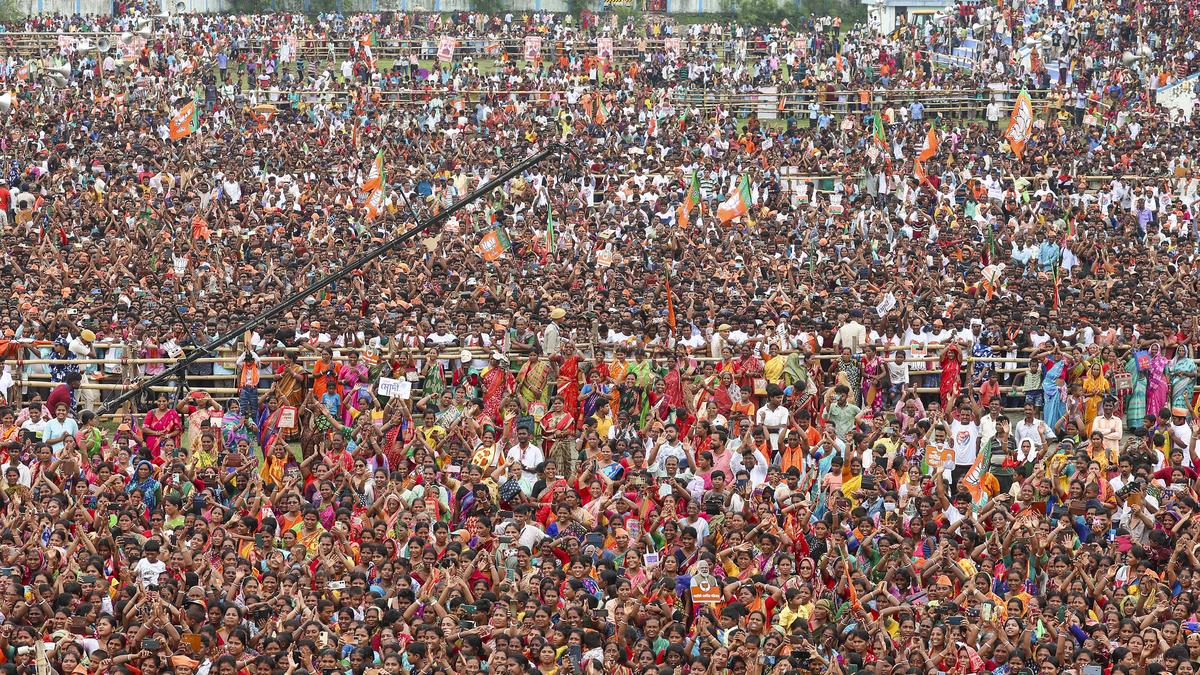
Permission for about 95,000 political rallies in West Bengal by EC, highest in the country
The Hindu
Sources in the ECI said that the number of applications and permission granted is highest in the country.
In the two and half month long election campaign the Election Commission of India has granted permission to about 94,975 applications for holding rallies and meetings for the election campaign in West Bengal. About 1,19,276 applications were made to the ECI during the seven phase campaign and the Commission granted permission to 94,975 rallies, public meetings and other forms of campaign.
Sources in the ECI said that the number of applications and permission granted is highest in the country. West Bengal elects 42 Lok Sabha MPs from the State, whereas states like Uttar Pradesh elect 80 and Maharashtra 48 MPs to the Lok Sabha. The data from the Suvidha portal of the ECI points out that about 10,245 permissions were granted in North 24 Parganas where two Lok Sabha seats - Basirhat and Barasat are going to polls in the last phase.
Use of helicopters
Another interesting set of statistics that has emerged from the campaign is the number of applications made to ECI for use of helicopters and helipads. Of the 890 applications the ECI had allowed use of helicopters in 669 cases. The Trinamool Congress has been the party that got 521 permissions whereas the Bharatiya Janata Party was able to use helicopters on 124 occasion. The ECI has seized cash, liquor, drugs, precious metal and freebies amounting to ₹440 crore in the seven phase long campaign. Liquor valuing ₹110 crores, freebies amounting to ₹91 crore and ₹34 crore cash was seized during the campaign
About 852 kgs of explosives, 1605 crude bombs and 707 firearms were also seized during the campaign. The status of complaints lodged through cVigil application includes 40,806 complaints received, action taken in 36,295,4443 complaints dropped and 68 pending.
Campaign for the last phase of elections concluded on May 30 and nine Lok Sabha constituencies of the State located in Kolkata, its suburbs and Sundarbans, which include Kolkata Dakshin and Kolkata Uttar, Dum Dum, Barasat, Diamond Harbour, Jadavpur, Basirhat, Joynagar and Mathurapur will go polls on Saturday.
A total of 1.63 crore voters - 83.19 lakh men, 80.20 lakh women and 538 third-gender people - are eligible to exercise their franchise in 17,470 polling stations in the last phase. The number of candidates in the poll fray stands at 124, which includes 100 men, 23 women and one from third gender.

“Writing, in general, is a very solitary process,” says Yauvanika Chopra, Associate Director at The New India Foundation (NIF), which, earlier this year, announced the 12th edition of its NIF Book Fellowships for research and scholarship about Indian history after Independence. While authors, in general, are built for it, it can still get very lonely, says Chopra, pointing out that the fellowship’s community support is as valuable as the monetary benefits it offers. “There is a solid community of NIF fellows, trustees, language experts, jury members, all of whom are incredibly competent,” she says. “They really help make authors feel supported from manuscript to publication, so you never feel like you’re struggling through isolation.”

Several principals of government and private schools in Delhi on Tuesday said the Directorate of Education (DoE) circular from a day earlier, directing schools to conduct classes in ‘hybrid’ mode, had caused confusion regarding day-to-day operations as they did not know how many students would return to school from Wednesday and how would teachers instruct in two modes — online and in person — at once. The DoE circular on Monday had also stated that the option to “exercise online mode of education, wherever available, shall vest with the students and their guardians”. Several schoolteachers also expressed confusion regarding the DoE order. A government schoolteacher said he was unsure of how to cope with the resumption of physical classes, given that the order directing government offices to ensure that 50% of the employees work from home is still in place. On Monday, the Commission for Air Quality Management in the National Capital Region and Adjoining Areas (CAQM) had, on the orders of the Supreme Court, directed schools in Delhi-NCR to shift classes to the hybrid mode, following which the DoE had issued the circular. The court had urged the Centre’s pollution watchdog to consider restarting physical classes due to many students missing out on the mid-day meals and lacking the necessary means to attend classes online. The CAQM had, on November 20, asked schools in Delhi-NCR to shift to the online mode of teaching.









